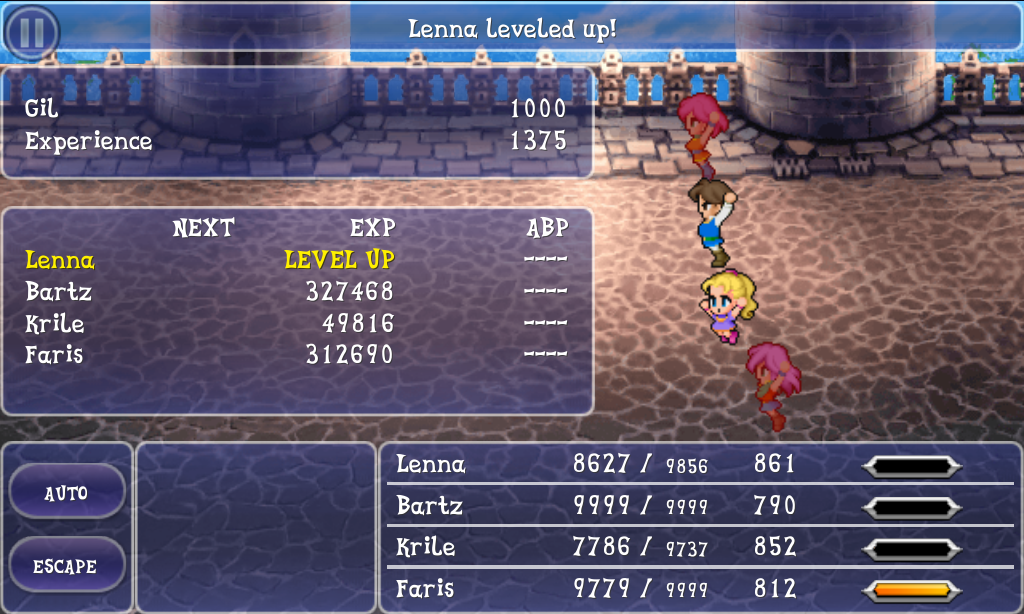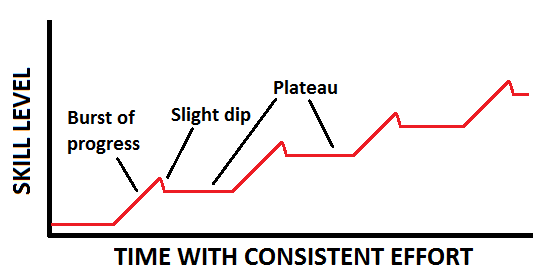In a previous post (Quality over Quantity), I mentioned my fondness for a book by George Leonard called Mastery. In that book he outlines that progress in any field can feel linear, but there will be a plateau. The plateau is unavoidable, but it does ultimately end if you stick with whatever you are trying to master. Then comes another period of linear growth (a burst), followed by a slight dip in skill, followed by another plateau. Onwards and upwards. It looks something like this:
When I read that book, this concept really resonated with me, but it’s only recently that I’ve really understood what it is to be within the plateau, and what it means to enjoy the plateau. For many of us, if there isn’t constant progress, it’s very discouraging. But progress can’t always be seen day to day, or even month to month or year to year.
Often I find myself in these “ruts” where I feel like I’m making zero progress on goals, and just floating doing the same things over and over at the same skill level. During these times, I admittedly get a little panicky and have urges to turn my life upside down and change everything. Ironically, all these things that I want to change are generally activities or commitments to which I’ve already gained a high degree of skill and progress. Still, when the gains stop coming, I feel the urge to quit.
Here’s the thing: the better you get at something, the slower the progress comes. When you start anything, you know nothing. Even putting in a small practice session at anything will yield immediate results, and the satisfaction that comes with that progress. Once those newbie gains are out of the way you have to work a lot longer and harder for additional progress. This continues until you can literally go years without feeling like you’re getting better.
That does not mean your efforts are in vain! It just means that you have already achieved a lot, and you are going for the progress that is harder to attain, but ultimately more rewarding.
Growing up, I was a fan of role-playing games (RPG’s) for various video game platforms. In these games, you assume the role of a character (or characters) that start the game with limited skills and power – usually your character starts as a “Level 1”. By defeating enemies (or whatever) your characters gain experience points and once a certain experience threshold is reached you gain a level! With the new level comes new abilities and added strength. Getting to the next level usually requires double the experience points of the previous level gain, so it takes twice as long. And during that time, you’re stuck at a measly level 2. Just imagine going from level 49 to 50…takes time.

That being said, although the early levels are easy to get, the rewards aren’t very, well, rewarding. They’re fun to get and appreciated, but they’re nothing like the new skills and powers you get in the high levels! Those are the real gems.
I am now trying to remind myself when I get into these imagined ‘ruts’ that these are not, in fact, ruts, but a long plateau formed from achieving an already somewhat high status at something. And that’s awesome because it means the greatest returns are still to come, but they will take time and consistent effort to realize. I’m not even close to perfect at this, but over time I have learned this lesson repeatedly.
In George Leonard’s book, he explains that this is where the Dabbler, the Obsessive, and the Hack all part ways with the path of the Master. The Dabbler moves onto something new where gains are once again easy to get. The Obsessive goes crazy trying to get to the next burst of progress only to burn himself out. The Hack is happy to ride the plateau indefinitely and never hit the next level.
The Master, however, loves the plateau. Although no progress is felt day-to-day, the Master knows the next level will come, it’s worth it, and has the patience to achieve it.
Looking back, this pattern has popped up in almost every area of my life. From scientific knowledge/skills, to weightlifting, to my career, to playing the guitar, to ultimate Frisbee, to something that has more of my attention than anything lately: dating and relationships.
I’m at a point where I’m very happy with my skills in many areas, and I’m enjoying the plateau. That being said, I am looking forward to bursting through and ‘levelling up’!
The best example of this for me was with my math skills (a bit nerdy of an example, but it works). My first degree was in physics, so taking advanced math courses was necessary as co-requisites for the more advanced physics courses. I was always good at physics, but struggled a bit with more advanced math. Throughout those later undergraduate years, I grinded away at multivariable, vector and tensor calculus so I could apply it to interesting physics problems. I was able to learn how to do it to a certain degree, but I didn’t really have a grasp of what it was that I was doing sometimes. I followed the equations and went through the motions I was taught to get the (sometimes…) right answers, but there was a lot of mystery to it. The flow did not feel natural…yet.
After my undergraduate physics degree, I pursued a graduate degree in mechanical engineering. During my year of course taking, I enrolled in “Fluid Dynamics”, which was lectured by the department head, and was known as one of the most brutal courses the department had to offer. The back bone of the course? You guessed it: multivariable, vector, and tensor calculus. I had seen the symbols and mathematical flow before, but this time it was different. My previous experience in physics gave me a bit of a leg up, so my confidence was high from the start. This time, I really took the time to figure out what these concepts really meant in a physical sense, and why we apply them to these problems, and an explosion of insight followed. I saw it. Click! The math that used to inhibit true understanding now unlocked it. I had levelled up. That summer, I looked back on some physics material that I hadn’t really understood when I first studied it, and went through it ‘fluidly’. That was very satisfying.
In conclusion – when it comes to skills or activities that you want to achieve a high level at, keep at it! A plateau is all part of the process. You will break through eventually. It will take longer if you are already advanced, but the hardest earned rewards are the most valuable.
Until next time,
Graham

